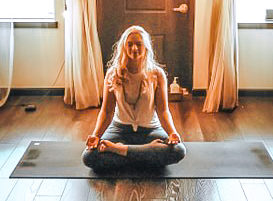contact
Shop
coaching
Learn More →
I help women create confidence through intuitive living and wellness.
Madeline Elizabeth
There is a big difference between religion and spirituality, though people often use them as interchangeable terms. The common phrase thrown around is “spiritual but not religious” and this has raised the question of what the difference even is. The two terms have a lot in common and have similar personal goals, but they aren’t the same thing at all. There are very distinct differences in the two so let’s break them down…
Religion
Religion is an organized system of beliefs, attitudes, practices, behaviors, and morals. There’s generally a specific higher power that is worshiped and a set of religious practices/rituals associated with religion (such as going to church, celebrating religious holidays, etc.). These practices tend to be shared among a community. There are about 4,200 religions in the world, each having its own set of practices and guidelines. The common goal of religion is to have a system of faith in specific higher power (such as God) and to live an obedient life in honor of that higher being.
Spirituality
Spirituality comes from within and the internal practice of peace and purpose. It generally refers to connecting to something larger than yourself. Taking time to connect to yourself, others, and the world around you is a big part of spirituality. This comes from an awareness of our inner self and the internalization of our souls. Spirituality isn’t defined by one act or belief, it’s more of internalization of life and meaning. The common goal of spirituality is coming to an understanding of purpose and self-realization.

How They Differ from each other:
1. Organized vs. Formless
Religion has an organized system that generally follows a set of rules/morals, a place of worship, and specific teachings. It is organized and similar among different communities. Often you can go to a place of worship of one faith and go to a different place of the same faith and have a similar structure. You would generally know what to expect and most people follow the same morals (or try/are expected to).
Spirituality focuses more on freedom of self-discovery. There isn’t a set path to follow or one set of rules. Those focusing on spirituality tend to do things that fit their lifestyle and allow them to feel free in life. Spirituality gears more towards experiences in life and personal growth. It can look completely different from one person to the next and there are no rules or structure to it.
2. Exclusive vs. Inclusive
This doesn’t mean who can be spiritual or religious, it’s based on who attends/participates. Religions are more exclusive communities in the sense that you probably wouldn’t see people in a place of worship that isn’t one that they believe in (Christians in a Buddhist temple, vice versa).
There aren’t restrictions on spirituality and who can practice. Anyone can practice it since there aren’t a set of rules, morals, or systematic structure. Any faith, belief, and lifestyle can incorporate spirituality and practice it regularly.
3. Moral vs. Purpose
There are ethics, morals, and values that most religions hold their members/believers to. Some refer to it as sin when there is rebellion or transgression against the divine. When followers go against these laws and morals, there is some sort of repenting (prayer, confessions, etc.). Throughout life, people that follow religions focus on following the morals to honor their higher power and/or to avoid negative effects in the afterlife (such as hell).
Throughout life, spirituality focuses on finding purpose and meaning. It’s about falling and getting up to learn and improve. Spiritual people often know and understand their purpose in life (or are actively working to understand) and shape their choices of how they may or may not impact their personal selves. It is very much associated with the present time and the immediate impacts that occur.
4. Truth Knowledge vs Truth Discovery
Most religions follow a book of some sort that shares experiences and lessons. Each religion has their own beliefs about what the truth is, and this knowledge is to be taught to others. This truth usually contains stories that help guide decision making, feelings, and lifestyles.
Much of spirituality comes from discovery and personal life experiences. This could relate to religion and coming closer to a higher power or it could be personal self-discovery untethered to religion. Discovering who you are, who you want to be, how you fit into the world, and your inner truth is where spirituality takes place.
5. External Divinity vs. Internal Divinity
There is a higher power in religion. This can be a God, amoral, a superhuman, a pasta monster (really, Pastafarian is a real religion). This power holds divinity within itself. Religion is seeing the divine and holding true to a greater being outside of yourself.
Higher power within one’s self is a more spiritual approach. This means that we hold the power to make changes in our lives and hold ourselves to a higher standard. This can come from manifestation and trusting the universe or just having the internal awareness of the divinity from within.
How They Relate
Both religion and spirituality are faith-based, it’s just a difference of what that faith is it; a higher being or one’s self. You can be religious and not spiritual, spiritual but not religious, religious and spiritual, or neither at all. Religion and spirituality relate to each other because both include having belief in something greater than just being here to live and they give direction to people’s lives. Religion and spirituality have many differences and it’s easy to confuse them with each other but it’s common to see them overlap in people’s lives. Most religious people find a sense of spiritual well-being in their lives and vice versa. It is important to note that even though religion and spirituality are so different, they can also become very intertwined.
back
